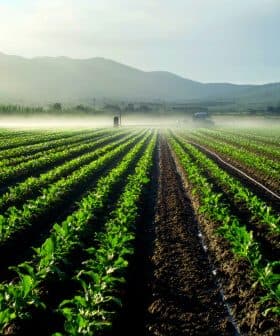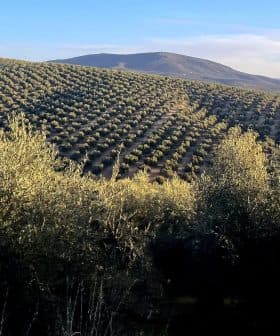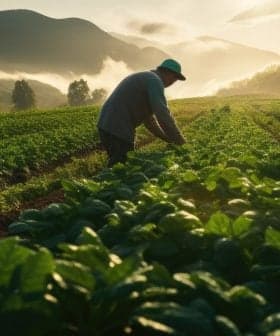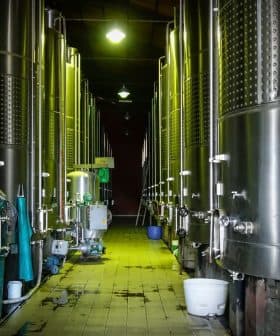Spanish Lawmakers Approve €2B Aid for Agriculture Sector Hit by Drought
While most of the funds are earmarked for improvements to water infrastructure and ranchers, the amount available to olive farmers is significantly less.
 Murcia, Spain (AP)
Murcia, Spain (AP) Spain’s Chamber of Deputies approved a Royal Decree-Law allocating almost €2.2 billion to counter the effects of a prolonged drought, with €636 million directly aiding farmers and ranchers. While the law passed with 58 votes in favor, criticism was voiced by conservative parties accusing the government of attempting to buy votes and not addressing underlying issues in the agricultural sector.
Spain’s lower house of congress, the Chamber of Deputies, has approved a Royal Decree-Law establishing measures to counter the effects of the prolonged drought.
The law earmarks almost €2.2 billion for this purpose, of which €636 million will directly aid farmers and ranchers. The law also adds complementary support measures of €148 million for the Common Agricultural Policy (CAP).
Minister of Agriculture Luis Planas told the Chamber of Deputies that the funds were necessary to protect “the security of food supply and the continuity of production activity.”
See Also:Water Efficiency, Sustainability Must Go Hand in Hand in the Olive GroveWhile the law passed with 58 votes in favor, none against and 11 abstentions, there was plenty of criticism.
Deputies from Spain’s traditional conservative party, Partido Popular, and a right-wing party, Vox, accused the socialist-led coalition government of attempting to buy votes and said the measures would help a few farmers and ranchers without solving the underlying issues.
“You distribute a few thousand euros that will be very useful for some livestock farms but will not solve the problems of the sector,” said Vox deputy José María Figaredo.
Planas said the support measures for the agricultural sectors had been divided into three large blocks, including direct aid, tax cuts and increased flexibility in deploying funds from the CAP.
Common Agricultural Policy
The Common Agricultural Policy (CAP) is a comprehensive policy framework established by the European Union to support and regulate the agricultural sector. It aims to ensure a stable supply of high-quality food, promote rural development, and provide fair income for farmers. CAP encompasses various measures, including financial support, market interventions and environmental initiatives, with the goal of fostering sustainable agriculture and ensuring the well-being of both farmers and consumers.
The largest share of direct aid – €355 million – is destined for ranchers and dairy farmers, deemed the most severely economically affected by the drought. There is also €276.7 million for the rest of the agricultural sector and €5 million for beekeeping.
Meanwhile, an extraordinary increase in subsidies to holders of agricultural insurance has been approved for an estimated €40.5 million. The aid is raised to a maximum of 70 percent of the cost of the already contracted policies, which is the maximum allowed by European regulations.
However, the benefits of the insurance subsidy are unlikely to help the country’s olive growers, as a recent investigation from Agropopular found that only 4.5 percent of the country’s olive grove surface area is insured.
“The figures are clear, very clear: of 2.04 million hectares, just over 93,000 are insured,” wrote César Lumbreras, Agropopular’s director.
Along with insurance subsidies, the new Royal Decree-Law also includes an exemption of the real estate tax quota of the affected farms and the corporate tax.
Royal Decree-Law
In Spain, a Royal Decree-Law (Real Decreto-Ley in Spanish) is a legal instrument that allows the government to issue legislation on urgent matters that require immediate attention. It is a type of legislative act that bypasses the usual parliamentary procedures and is used in situations where the government needs to take swift action without going through the regular legislative process.
The third component focuses on enhancing flexibility in implementing the CAP by extending the application deadline for aid until June 30 and reducing the frequency of mandatory information submissions from digital farm logbooks in 2023 and 2024.
Planas has expressed appreciation for the ruling, which involves postponing social security contributions and extending the exceptional measure until December 31 to reduce the minimum days required to access agricultural subsidies in Andalusia and Extremadura to just 10.
On the other hand, the minister pointed out that this Royal Decree-Law also includes a series of hydrological measures to deal with the drought.
He said the government had been gradually increasing the budget for water conservation and infrastructure improvements, which, during the period of the CAP, 2023 to 2027, will have a budget of €22 billion, of which €10 billion are direct investments by the state.
In addition to the CAP budget, the minister pointed out that €1.4 billion will be allocated from the Royal Decree-Law to finance four areas: amending water legislation to promote water reuse, introducing measures to support irrigation efforts and encouraging the construction of significant infrastructure projects and provide specific relief for an Andalusian community.
Planas added that these changes would allow the General State Administration to manage and carry out these efforts. The objective is to address the drought and enhance water availability in the regions that require it most.
Share this article










